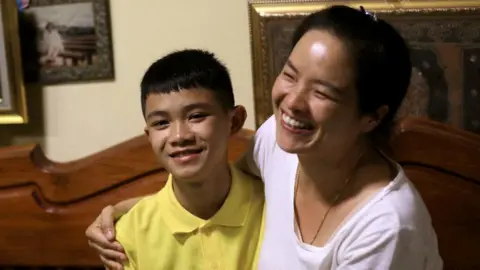Thai cave rescue: Duangpetch Promthep's death shatters happiest of endings
 Reuters
ReutersWe still do not know what caused the sudden death of Duangpetch 'Dom' Promthep at the football academy in Britain to which he had been so proud to win a scholarship last year.
It casts, for the first time, a sad shadow over a story which until now had not lost its power to inspire, to lift the spirits.
The astonishing saga of the Thai boys rescued from the cave in July 2018 was that rarest of things in the news business: a tale with an almost flawlessly happy ending, although two Thai divers died, one during preparations for the rescue and one later from a blood infection picked up in the cave.
When we first got news that a group of Thai footballers had gone missing, I had dashed with my colleagues up to Chiang Rai, and then to the entrance of the Tham Luang cave complex, carrying just three days of clothes.
In my haste I had assumed few people around the world would care for long. The boys would be found, or perhaps they never would. That would be that. It was quite a misjudgement, and in the mud-soaked conditions outside the cave, I would come to regret my packing decisions.
Five days later, with no indication that the boys were alive or where they might be, and Thai rescuers driven out of the cave by rising flood waters, I was interviewed by a Thai television team.
I found I was too emotional to respond. The boys were more or less the same age as my two sons. Dom was just 12 days older than my eldest. Reporting about them day and night, seeing their bikes still chained to the railings by the cave, they had become very precious lives.
Against all the evidence, all of us hoped against hope that they might still be alive.
And then that astonishing moment, when British divers John Volanthen and Rick Stanton found them, calling out in the dark, "how many are you? Thirteen? Brilliant". It seemed nothing less than a miracle.
The journalists at the cave site multiplied quickly, far more than it could accommodate. But we knew getting the boys out would be difficult. So difficult, in fact, that the divers had told the Thai government getting even half of them out alive should be considered a success.
 Reuters
ReutersBy now they were the most famous boys in the world. All of Thailand was rooting for them. For days the Thai authorities had pushed for a zero-risk option - leaving the boys there until the monsoon rains stopped four months later, even though they were warned this was a near-certain death sentence. Their lives had become too precious.
And when they eventually went for the high-risk, improvised rescue plan, and we watched the boys and their coach being brought out, heavily sedated, one by one over three days, it seemed impossible they had all survived.
But they did. And within days they were charming the world in their first appearance before the media, smiling, joking, knocking footballs around.
The Thai government took control at that point, leading the lucrative negotiations with Hollywood filmmakers and organising overseas trips. Yet none of that ever spoiled them.
They remained small-town boys with a few big dreams - polite, grateful for the effort so many had made to save them, and for the new opportunities their story had brought them to travel and study, but always refreshingly down-to-earth. Even the fear that fame would inevitably tarnish the fairy tale proved unfounded.
When he won the scholarship to go to Britain last year, Dom thanked Zico, the former Thai national team captain who had arranged it, and promised to study hard there.
"I will do my level best," he wrote. No-one who watched him and his team-mates dealing so modestly with all the attention that came their way can doubt that he would have lived up to that promise.
